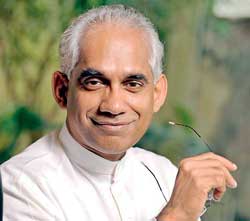Monday Feb 23, 2026
Monday Feb 23, 2026
Wednesday, 27 May 2015 01:54 - - {{hitsCtrl.values.hits}}
Business Standard: A banker turned politician, Sri Lanka’s Deputy Minister for Highways and Investment Promotion Eran Wickramaratne says trade and investment with India can grow exponentially but makes a strong case for reduction of non-tariff barriers (NTBs) by India.
In an interview with Sanjay Jog, Wickramaratne explains how both countries can prosper and help the region.

Q: Both the heads of India and Sri Lanka have said economic ties are the pillars of the relationship between the two countries. What is your take?
A: There has been political normalisation of relations since the change of Presidency in Sri Lanka after January this year. The Sri Lankan President Maithripala Sirisena visited India and Prime Minister Narendra Modi too visited Sri Lanka. This is quite significant. In the past, the relationship was more politically-driven but in the future it will be driven by the economic partnership between the two countries. I think that’s the way to go.
India is a large country, a large potential market for Sri Lanka. On the other hand, Sri Lanka is a small country with an educated workforce, good infrastructure, good communications and logistics. Sri Lanka can make that available for Indian companies basically who want to source from the region, sell to the region or even beyond Europe.
Q: What are the major roadblocks for further increasing economic and trade relations between the two countries?
A: India has [an] abundance of labour. Sri Lanka has to be a little higher on the value chain as it has lots of professional services which could be used in BPO at the higher end. Sri Lanka is now ready for manufacturing.
Some of India’s problems are to do with non-tariff barriers (NTBs) as India has to work across several states. But Sri Lanka offers one jurisdiction, one administrative state and therefore it is easier basically to do business. There are advantages in doing business in Sri Lanka. Indian companies also could be mutually benefited. Ultimately both countries need to grow.
However, NTBs have caused some apprehensions among Sri Lankan businesses. India and Sri Lanka have a free trade agreement (FTA). Trade has increased between the two countries but it can grow exponentially if both work together towards reducing NTBs.
Q: Are there any other hurdles?
A: NTBs are the largest roadblock. India also needs to liberalise exports of value-added products and design and marketing. For example, Sri Lanka is a tea exporter but not talking about bulk exports of tea into India. India has a natural advantage, it has a lower base and that is why Sri Lanka imports a lot from India and the trade balance is heavily in favour of India. So for the two countries to grow, we need to look at Sri Lankan exports to India.
Q: Is there any target fixed by both countries?
A: I would not put up any number but trade and investment can grow. India and Sri Lanka can even expand FTA into a comprehensive economic partnership, but [they] have to deal with the issues of NTB and build confidence on both sides. If we build that confidence, then the sky is the limit.
Q: What are the key sectors in which both India and Sri Lanka can further strengthen economic ties?
A: Manufacturing, tourism, power, roads, highways, ports and several others. India is building a coal-based plant; Sri Lanka has recently signed a preliminary agreement. Further, Sri Lanka can benefit from India’s civil nuclear program. That has been a clear understanding.
Q: What about India’s banking sector?
A: Indian banks have been in Sri Lanka for a very long time. The Sri Lankan banking system is a fairly advanced and modern one after being liberalised in 1977. Multinational banks came in at that time and we have a couple of them. There will be consolidation of the banking industry in Sri Lanka and when it consolidates the only destination for it to look at is India.
Q: India wants to counter China’s strategic influence in Sri Lanka. What is your comment?
A: Sri Lanka has a very long relationship with China and today China is one of the two Asian economic powers. Therefore, no country can ignore India or China.
India’s relationship with China has grown in recent years, trust is beginning to grow. As that relationship grows, the relationship between India and Sri Lanka also grows. Our economic relationships with both India and China must grow. (The) Chinese have stood with Sri Lanka in bad times too, we appreciate that. There is room for both relationships to grow.
Q: Similarly, will Pakistan’s growing relations with Sri Lanka work as a speed breaker?
A: Our relationship with Pakistan has been even-handed. Pakistan has been a friend of Sri Lanka and continues to be friend of Sri Lanka. Sri Lanka’s strong relations with Pakistan can actually be a bridge between India and Pakistan not just economically but politically too. We have a FTA with Pakistan too. Indian companies and Pakistani companies could profit by using Sri Lanka.